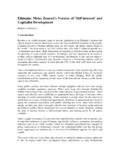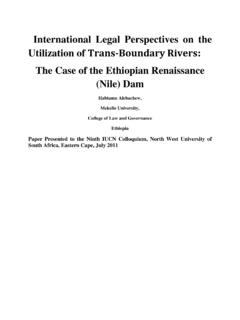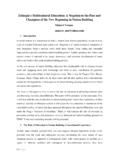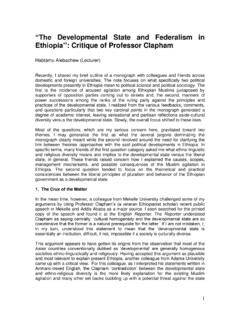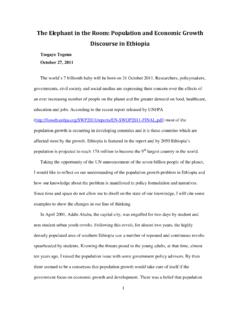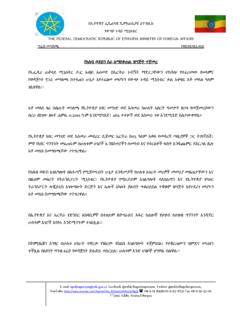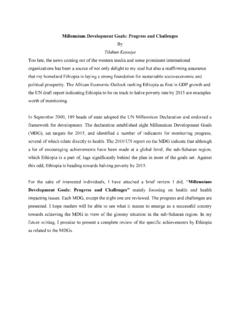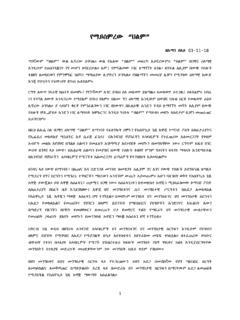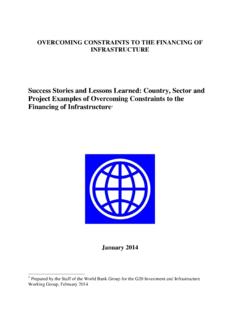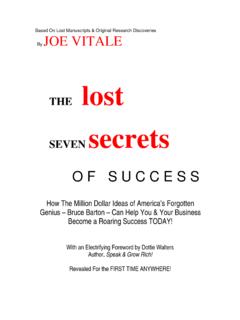Transcription of A LESSON FROM KOREAN ECONOMIC SUCCESS
1 1 A LESSON FROM KOREAN ECONOMIC SUCCESS Fanowedy Samara , Seoul-South Korea Comment on The Republic of Korea, commonly known as South Korea, is one of the most successful newly emerging countries. Several scholars associate this miraculous KOREAN ECONOMIC SUCCESS to many factors such as Education, Saving culture, industriousness, Governance, and even the contribution of KOREAN Chaebols-Conglomerates. The KOREAN Institute for International Trade (KITA) identified four major driving wheels of the KOREAN economy. It puts openness as the most critical element in booming their economy. This is basically to mean export-led ECONOMIC development approach enriched with trade liberalization, according to Ms. Hyun-Jung Je.
2 She emphasizes that KOREAN economy grew from almost nothing in1957 to one Trillion US Dollars in 2011 because its strong focus on exports. The second prominent factor to KOREAN ECONOMIC achievement goes to human capital (which is the second driving wheel according to KITA). Korea gives special attention to educate its citizens. Professor Whoochan Kim from Korea University further strengthens this idea by saying that at the beginning of the KOREAN economy, our government invited scholars, mainly US scholars, to train Koreans. He also added that the KOREAN government did not encourage Koreans to train abroad; it rather created enabling environment by inviting different intellectuals to Korea. KITA underlined efficient governance as the third key factor for KOREAN Economy.
3 According to KITA, government vision and policy played crucial roles in securing rapid and sustainable ECONOMIC growth for the last consecutive decades. To further notice the importance of efficient and committed governance, it is better to see some comparative achievements of both South and North KOREAN economies across time. History of Per Capita income of South and North Koreas (In USD) Year 1960 1965 1970 1975 1980 2000 2009 2010 2012 South Korea 83 106 242 574 1592 10841 17175 20759 >24000 North Korea 280 162 240 750 959 959 960 688 1000 Source: Lecture by Mr. HYUN In-Tae (Special Advisor to the President for Unification Policy, Former Minister of Unification), Seoul-South Korea You can imagine that per capita income of North Korea was more than three folds of South Korea during the aftermath of the KOREAN War though it is 24 times larger than that of North Korea today.
4 That is what KITA and many KOREAN Scholars mean by efficient governance. And consequently, it managed to ensure rapid and sustainable ECONOMIC growth which enabled Korea to be the 13rd largest economy in the world. South KOREAN Government is also very smart to learn from its history. It pays significant attention to past lessons. For instance it drew four viable lessons from the KOREAN War. Ambassador Cho Tai-young, Deputy Minister for public Affairs with Ministry of Foreign Affairs of the Republic of Korea, pointed out these four important lessons as (1) Korea need to be strong enough to deter any war attempt, (2) no more war in the KOREAN peninsula for war destroys almost everything (3) creating peaceful KOREAN Peninsula for peace is crucial tool to ensure sustainable development, and (4) unification of the peninsula (though this fourth element is not an immediate demand for them).
5 2 Professor Whoochan Kim also supports the idea of efficient governance in realizing sustainable ECONOMIC successes. He states that without clear vision, without its commitment to invest in education, and without supporting entrepreneurs, it would be improbable to achieve these miraculous ECONOMIC victories. Likewise, government even subsidized investors in order to participate in heavy industries at early days. And government in fact, supported them by allowing foreign currency at overvalued official exchange rate, the professor added. And the government played very essential roles in introducing import substitution policies in early days so as to take off KOREAN industries. Corporations also play momentous roles in achieving KOREAN ECONOMIC SUCCESS .
6 This is the fourth important factor according to KITA. Professor Whoochan Kim consolidates this factor by giving examples. He indicated that the contribution of KOREAN General Trading Companies (GTC) to the KOREAN total export was and in 1977 and 1991 respectively. Promoting domestic demand, expanding global network and advancing ECONOMIC structure as well are the key paradigms for sustainable KOREAN ECONOMIC growth, KITA. The KOREAN ECONOMIC SUCCESS is actually manifested in its IT boom and expansion of the New Media as well. It is the world s number one nation in terms of internet penetration and number of internet users. Professor Sejung Marina Choi from Korea University explains that Korea has more than 40 Million internet users, which is almost 83% of its total population.
7 According to the professor, Japan and Taiwan are the second and third countries where 80% and 70% respectively of their population uses internet. Thus, KOREAN economy is remarkably supported by the New Technology as well. The expansion of this new technology, however, is posing significant danger on the conventional Media, particularly TV, Radio, papers and magazines. That is, the internet boom comes up with serious warnings to the traditional Media. Currently the Internet invaded all Koreans and almost everyone produces and disseminates news and feature. Professor Seongcheol Kim from Korea University states that about Million Koreans, which is to mean 99% of KOREAN Households, are high speed internet subscribers. Likewise more than 100% ( ) of KOREAN people are mobile telephone subscribers, of which 30 million (more than 60%) are Smartphone users.
8 This situation has become a serious challenge for traditional Media industries. And hence, the number of subscribers to this traditional media is significantly reducing from time to time. According a report from the KOREAN press foundation in 2011, people who read News papers decreased from in 2002 to in 2011. On the other hand, the number of people who do not read News papers increased from in 2002 to in 2011 (Year book of the KOREAN Press/2011). Though the number of subscribers significantly decreases over time, big companies still continue spending a lot of advertisement money to News papers. Even the reduction is almost insignificant. Professor Sejung Marina Choi consolidates this phenomenon by stating that the amount of money spending to News papers decreases from 2,934, 000,000 USD in 2000 to 2, 821,000,000 USD in 2012.
9 And the projection for 2013 is almost similar (2,680,000,000 USD). The reason why big companies still spend their money on big companies could be associated to two rationales; on the one hand, news papers have conventional good will and trust which they built over time; and on the other hand, they are still powerful and are capable of creating backfires, Professor Seongcheol Kim explained. 3 But the amount of advertisement money spending in the Internet dramatically increased from 118,000,000 USD in 2000 to 1, 611, 000,000 USD in 2012. And the projection for 2013 is almost 1, 177,000,000 USD, Professor Kim added. Now, it is not as such complicated to evaluate how the internet is challenging the traditional Media.
10 Koreans normally support their business by conducting timely researches. Thus, they are well aware of the situation and are doing their best to go in line with the existing demands. Currently, almost every news paper has mobile plat form to provide its stories via mobile phones. And of course, there were 1064 Internet News papers in 2011 as per the Press foundation report (Year book of the KOREAN Press/2011). Even every broadcasting media uses mobiles as its medium for disseminating stories. Otherwise, the traditional media will be out of the game if it after all ignores the young generation, who does not like to read news papers, magazines even books. It urges to have access to every story from its mobile phones, no need to spend time and no need to carry loads of papers while he/she can easily access it through the internet.
